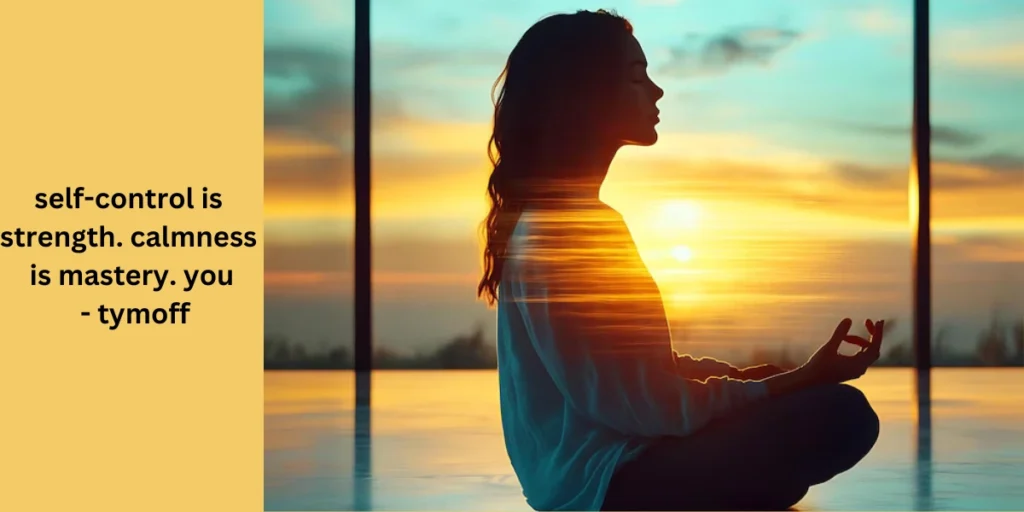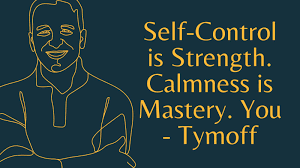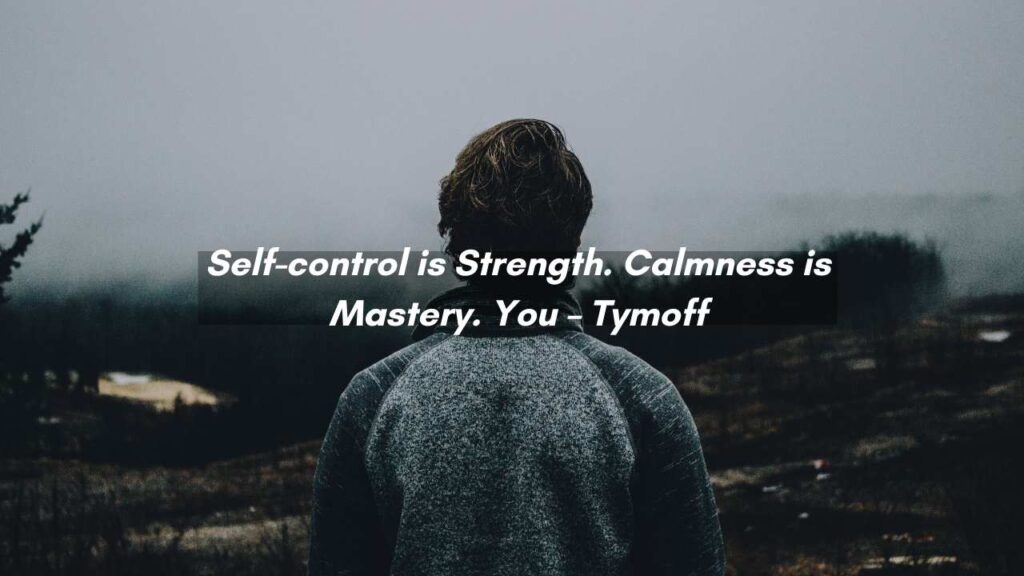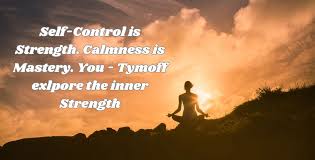Introduction to the Concept: Self-Control is Strength. Calmness is Mastery. You – Tymoff
In today’s fast-paced world, the idea of maintaining inner peace and self-discipline has become increasingly important. The phrase “Self-Control is Strength. Calmness is Mastery. You – Tymoff” highlights the power of these traits in achieving personal success and well-being.
Self-control allows individuals to manage their impulses and reactions, while calmness provides the clarity needed to face challenges. Understanding how these qualities work together can significantly improve various aspects of life.
Visit photeeq
What Does Self-Control Mean?
Self-control is the ability to regulate one’s emotions, thoughts, and behaviors in the face of temptations and impulses. It allows a person to make rational decisions rather than reacting based on emotions. This trait is essential for personal growth and development because it helps individuals stay focused on their long-term goals.
- Importance of Self-Control: Self-control helps in resisting short-term temptations in favor of long-term benefits. It keeps you disciplined in various areas like diet, finances, and relationships.
- How to Develop Self-Control: Building self-control involves practicing patience, setting clear goals, and being aware of your triggers. It takes consistent effort and a conscious approach to manage one’s impulses.

Why Self-Control is Considered Strength
The phrase “Self-Control is Strength” emphasizes how being able to control your actions and responses gives you power over your life. Unlike physical strength, self-control is about mastering the mind and emotions. It enables a person to make better decisions, avoid conflicts, and maintain focus on what truly matters.
See Rena Monrovia When You Transport Something By Car
- Strength Over Impulses: Self-control provides the strength to say no to distractions and focus on what is important. It helps in managing emotions, which can otherwise lead to irrational decisions.
- Mental Resilience: When you possess self-control, you develop mental resilience. This resilience makes it easier to face setbacks and challenges without being overwhelmed by them.
Calmness is Mastery: What It Really Means
The term “Calmness is Mastery” suggests that being calm in stressful situations allows a person to have control over their environment and outcomes. Calmness is not about being passive; it’s about maintaining a composed mindset even when faced with challenges.
- Why Calmness Matters: Calmness helps in reducing anxiety, making better decisions, and handling stress effectively. A calm mind is a powerful mind.
- How to Cultivate Calmness: Breathing exercises, meditation, and taking a moment to pause before reacting can help in developing calmness. These practices allow you to step back and view situations with a clear mind.
The Role of “You” in the Phrase
The word “You” in “Self-Control is Strength. Calmness is Mastery. You – Tymoff” highlights the personal responsibility each individual has in achieving self-discipline and calmness. It is a reminder that you have the power to shape your responses and actions, ultimately determining your success and happiness.
- Self-Awareness: Being aware of your strengths and weaknesses is crucial. It helps you understand where you need to apply self-control and calmness.
- Taking Responsibility: It’s up to each person to take charge of their growth. By practicing self-control and calmness, you can navigate life more effectively.
Practical Tips to Improve Self-Control
Developing self-control is a continuous process, and there are practical steps you can take to improve it in daily life.
- Set Clear Boundaries: Define what is acceptable behavior for yourself and stick to those standards.
- Practice Mindfulness: Mindfulness helps you stay present and aware, making it easier to control impulses.
- Reward System: Rewarding yourself for maintaining self-control can motivate you to keep going.
- Daily Reflection: Take time to reflect on your actions each day and identify areas where you could have applied more self-control.
Ways to Cultivate Calmness in Stressful Situations
Calmness can be a challenge, especially when life throws unexpected difficulties your way. Here are some effective ways to maintain calmness:
Check this doublelist app
- Focus on Breathing: Deep breathing can slow down your mind and calm your nerves.
- Take Breaks: Stepping away from stressful situations can provide a fresh perspective.
- Positive Affirmations: Reminding yourself that “this too shall pass” can help you remain calm.
- Practice Gratitude: Being thankful for what you have can shift your focus from stress to positivity.

Self-Control and Calmness in Professional Life
Both self-control and calmness are vital traits in the professional world. They not only make you a better leader but also help in creating a positive work environment.
- Self-Control in the Workplace: Self-control allows you to manage conflicts with colleagues, meet deadlines, and avoid procrastination.
- Calm Leadership: Leaders who maintain calmness inspire confidence among their team members. Calmness during crises ensures that decisions are made wisely.
The Connection Between Self-Control and Mental Health
Self-control and calmness have a direct impact on mental well-being. They contribute to reducing anxiety, managing stress, and maintaining a positive outlook.
- Reduced Anxiety: With better control over your emotions, you are less likely to feel overwhelmed by daily challenges.
- Increased Focus: Calmness allows you to focus better, which can improve productivity and overall mental clarity.
- Balanced Emotions: Being in control of your emotions helps in maintaining balanced relationships and a stable mindset.
The Philosophy Behind Tymoff’s Approach
The phrase “Self-Control is Strength. Calmness is Mastery. You – Tymoff” comes from a philosophy that values inner peace and personal growth. Tymoff emphasizes the importance of looking within to find strength and mastery over one’s emotions.
- Inner Reflection: Reflecting on your thoughts and actions is key to achieving self-mastery.
- Continuous Improvement: The philosophy encourages ongoing self-improvement through mindfulness and discipline.
How “Self-Control is Strength. Calmness is Mastery. You – Tymoff” Can Change Your Life
Adopting the mindset of self-control and calmness can lead to a more fulfilling life. It allows you to handle relationships better, face challenges with courage, and find peace within yourself.
- Better Relationships: With improved self-control and calmness, communication in relationships becomes more effective.
- Career Success: These traits can make you a better problem-solver, a respected leader, and a reliable team member.
- Personal Happiness: When you are in control of your emotions, you experience a sense of inner peace that contributes to overall happiness.
Conclusion
“Self-Control is Strength. Calmness is Mastery. You – Tymoff” is more than just a saying; it is a way of living. By embracing self-discipline and a calm mindset, you can improve your personal and professional life. It’s a reminder that true strength comes from within, and mastering your emotions is the key to unlocking a fulfilling life.

FAQs
1. What does “Self-Control is Strength” mean?
“Self-Control is Strength” means having the ability to manage your impulses and reactions, which makes you stronger in handling life’s challenges.
2. Why is calmness considered mastery?
Calmness is considered mastery because it allows a person to think clearly and make better decisions during stressful situations.
3. How can I improve my self-control?
You can improve self-control through mindfulness, setting goals, practicing patience, and reflecting on your actions daily.
4. How does self-control affect mental health?
Self-control helps reduce anxiety and stress, leading to improved mental well-being and focus.
5. Can self-control and calmness benefit my career?
Yes, self-control helps in maintaining discipline, while calmness enables better decision-making, both of which are valuable in professional settings.
6. How can I practice calmness in daily life?
You can practice calmness through deep breathing, taking breaks, using positive affirmations, and focusing on gratitude.
7. What is the role of “You” in the phrase?
The word “You” emphasizes that each individual is responsible for developing their own self-control and calmness to improve their life.
8. How do self-control and calmness work together?
Self-control helps in managing impulses, while calmness provides clarity, allowing a person to navigate challenges effectively.
9. Is self-control more important than talent?
Self-control is often considered more crucial than talent because it ensures that you stay disciplined and focused, which is essential for long-term success.
10. What is the message behind Tymoff’s philosophy?
Tymoff’s philosophy encourages self-reflection, inner strength, and the importance of mastering one’s emotions for a balanced and successful life.
